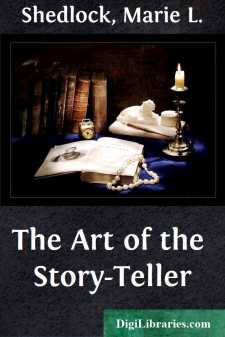Categories
- Antiques & Collectibles 13
- Architecture 36
- Art 48
- Bibles 22
- Biography & Autobiography 813
- Body, Mind & Spirit 142
- Business & Economics 28
- Children's Books 17
- Children's Fiction 14
- Computers 4
- Cooking 94
- Crafts & Hobbies 4
- Drama 346
- Education 46
- Family & Relationships 57
- Fiction 11829
- Games 19
- Gardening 17
- Health & Fitness 34
- History 1377
- House & Home 1
- Humor 147
- Juvenile Fiction 1873
- Juvenile Nonfiction 202
- Language Arts & Disciplines 88
- Law 16
- Literary Collections 686
- Literary Criticism 179
- Mathematics 13
- Medical 41
- Music 40
- Nature 179
- Non-Classifiable 1768
- Performing Arts 7
- Periodicals 1453
- Philosophy 64
- Photography 2
- Poetry 896
- Political Science 203
- Psychology 42
- Reference 154
- Religion 513
- Science 126
- Self-Help 84
- Social Science 81
- Sports & Recreation 34
- Study Aids 3
- Technology & Engineering 59
- Transportation 23
- Travel 463
- True Crime 29
The Art of the Story-Teller
Description:
Excerpt
Story-telling is almost the oldest art in the world—the first conscious form of literary communication. In the East it still survives, and it is not an uncommon thing to see a crowd at a street corner held by the simple narration of a story. There are signs in the West of a growing interest in this ancient art, and we may yet live to see the renaissance of the troubadours and the minstrels whose appeal will then rival that of the mob orator or itinerant politician. One of the surest signs of a belief in the educational power of the story is its introduction into the curriculum of the training-college and the classes of the elementary and secondary schools. It is just at the time when the imagination is most keen, the mind being unhampered by accumulation of facts, that stories appeal most vividly and are retained for all time.
It is to be hoped that some day stories will be told to school groups only by experts who have devoted special time and preparation to the art of telling them. It is a great fallacy to suppose that the systematic study of story-telling destroys the spontaneity of narrative. After a long experience, I find the exact converse to be true, namely, that it is only when one has overcome the mechanical difficulties that one can "let one's self go" in the dramatic interest of the story.
By the expert story-teller I do not mean the professional elocutionist. The name, wrongly enough, has become associated in the mind of the public with persons who beat their breast, tear their hair, and declaim blood-curdling episodes. A decade or more ago, the drawing-room reciter was of this type, and was rapidly becoming the bugbear of social gatherings. The difference between the stilted reciter and the simple story-teller is perhaps best illustrated by an episode in Hans Christian Andersen's immortal "Story of the Nightingale." The real Nightingale and the artificial Nightingale have been bidden by the Emperor to unite their forces and to sing a duet at a Court function. The duet turns out most disastrously, and while the artificial Nightingale is singing his one solo for the thirty-third time, the real Nightingale flies out of the window back to the green wood—a true artist, instinctively choosing his right atmosphere. But the bandmaster—symbol of the pompous pedagogue—in trying to soothe the outraged feelings of the courtiers, says, "Because, you see, Ladies and Gentlemen, and above all, Your Imperial Majesty, with the real nightingale you never can tell what you will hear, but in the artificial nightingale everything is decided beforehand. So it is, and so it must remain. It cannot be otherwise."
And as in the case of the two nightingales, so it is with the stilted reciter and the simple narrator: one is busy displaying the machinery, showing "how the tunes go"; the other is anxious to conceal the art. Simplicity should be the keynote of story-telling, but (and her the comparison with the nightingale breaks down) it is a simplicity which comes after much training in self-control, and much hard work in overcoming the difficulties which beset the presentation.
I do not mean that there are not born story-tellers who could hold an audience without preparation, but they are so rare in number that we can afford to neglect them in our general consideration, for this work is dedicated to the average story-tellers anxious to make the best use of their dramatic ability, and it is to them that I present my plea for special study and preparation before telling a story to a group of children—that is, if they wish for the far-reaching effects I shall speak of later on. Only the preparation must be of a much less stereotyped nature than that by which the ordinary reciters are trained for their career.
Some years ago, when I was in America, I was asked to put into the form of lectures my views as to the educational value of telling stories....


